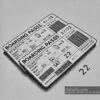discourage meaning
discourage :
to make someone less confident or enthusiastic
Verb
▪ The teacher discouraged cheating on the test.
▪ The teacher made cheating on the test less likely.
▪ His failures discouraged him from trying again.
▪ His failures made him less likely to try again.
paraphrasing
▪ dishearten – make someone lose hope
▪ deter – prevent someone from doing something
▪ dissuade – persuade someone not to do something
▪ undermine – weaken someone's confidence

Pronunciation
discourage [dɪsˈkʌr.ɪdʒ]
The stress is on the second syllable 'cour' and sounds like 'dis-KUR-ij'.
Common phrases and grammar about discourage
discourage - Common meaning
Verb
to make someone less confident or enthusiastic
Part of Speech Changes for "discourage"
▪ discouragement (noun) – the act of discouraging someone
▪ discouraging (adjective) – causing someone to lose confidence
▪ discouragingly (adverb) – in a way that discourages
Common Expressions with "discourage"
▪ discourage someone – to make someone less likely to do something
▪ discourage participation – to prevent people from joining
▪ discourage cheating – to stop people from cheating
▪ discourage investment – to make people less likely to invest
Important examples of discourage in TOEIC
Vocabulary examples from the TOEIC test
In TOEIC Part 5 vocabulary questions, discourage is often used to mean 'to prevent or reduce the likelihood of someone doing something'.
Example of a confusing word: dissuade (to persuade not to do something)
Grammar examples from the TOEIC test
In TOEIC grammar questions, discourage is used as a transitive verb and is often followed by 'from' plus a gerund.
discourage
Idioms and fixed expressions in TOEIC
discourage someone from doing something
to make someone less likely to do something, used in formal contexts.
Differences between similar words and discourage
discourage
,
deter
differences
discouraging is to make someone less willing, while deter is to prevent someone through fear or doubt.
discourage
,
dissuade
differences
discourage is to make someone less willing, while dissuade is to actively persuade someone not to do something.
Words with the same origin as discourage
The origin of discourage
The word 'discourage' combines the prefix 'dis-' meaning 'not' with 'courage', meaning it signifies reducing courage.
Word structure
It has the prefix 'dis-' (not) and the root 'courage' (bravery), so 'discourage' means 'to reduce bravery or confidence'.
Words with the same origin
The root of 'discourage' is 'courage' (bravery). Words with the same root include 'courage', 'encourage', 'courageous', and 'courageously'.
Please select an image in the quiz
Previous post and next post







